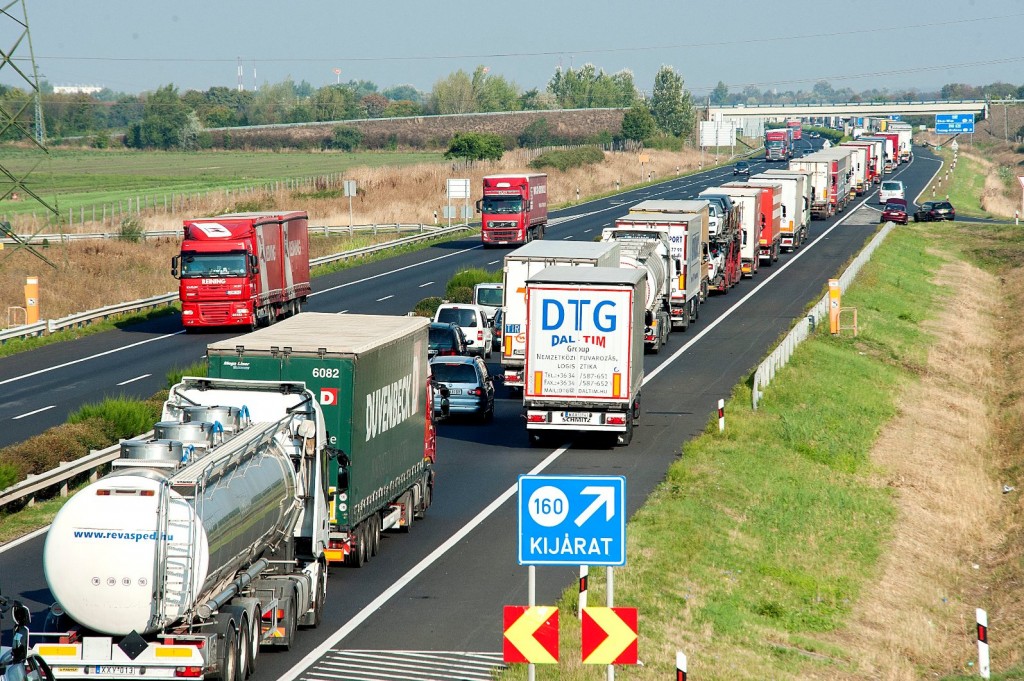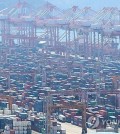- California Assembly OKs highest minimum wage in nation
- S. Korea unveils first graphic cigarette warnings
- US joins with South Korea, Japan in bid to deter North Korea
- LPGA golfer Chun In-gee finally back in action
- S. Korea won’t be top seed in final World Cup qualification round
- US men’s soccer misses 2nd straight Olympics
- US back on track in qualifying with 4-0 win over Guatemala
- High-intensity workout injuries spawn cottage industry
- CDC expands range of Zika mosquitoes into parts of Northeast
- Who knew? ‘The Walking Dead’ is helping families connect
Austria inspects trucks for migrants, creates 18-mile backup

A long queue of vehicles waits on the M1 motorway near the border between Hungary and Austria near Mosonmagyarovar, 158 km northwest from Budapest, Hungary, Monday, Aug. 31, 2015. The line has reached 20 kilometers as every vehicle capable of smuggling people is checked at the border after 71 migrants were found dead in a truck Thursday. (Csaba Krizsan/MTI via AP)
BUDAPEST, Hungary (AP) — Austria stepped up vehicle inspections Monday at its Hungarian border after 71 migrants apparently suffocated in a truck, creating a huge traffic jam on the main Budapest-Vienna highway.
In addition to the gridlock at the Hegyeshalom border crossing — about a 30-kilometer (18 1/2-mile) backup at its peak — traffic was slower than usual at other spots along the Hungary-Austria border, the traffic monitoring firm Utinform reported.
Traffic appeared to be flowing fairly smoothly by late afternoon and Austrian Interior Ministry spokesman Karl-Heinz Grundboeck said they would continue to conduct “spot checks” of vehicles at all main border crossings.
At Budapest’s Keleti train terminal, meanwhile, hundreds of migrants, many saying they were from Syria, were boarding trains headed west to Austria and Germany, without apparent police intervention.
In past months, Hungarian police, sometimes acting with colleagues from Germany and Austria, often removed migrants without the necessary travel documents from the trains.
On Monday afternoon, there were long lines of migrants at the terminal’s ticket windows and police said a statement on the situation there would be forthcoming.
Two of the express trains that left Budapest, however, were stranded on the Austro-Hungarian border after the Austrian Federal Railways refused to allow them to proceed into Austria, citing “overcrowding.” Austrian police spokesman Roman Hahslinger said some of those on the trains subsequently disembarked and continued into Austria with regional trains.
A train with around 400 migrants from Budapest arrived in Germany on Monday evening, first stopping in the southern Bavarian city of Rosenheim where some were offloaded, while others then carried on to Munich, the dpa news agency reported.
Border police said 190 of the migrants were taken in Rosenheim to a former military barracks to be registered. They included a family with five small children from Afghanistan who had fled three months ago, and others from Pakistan saying they had fled the Taliban.
Another 200 traveled on to Munich where police went through the process of registering them in a hall at the main train station. Passers-by spontaneously handed out water and candy to the new arrivals, dpa reported.
It was not immediately clear where these migrants would be taken, but typically refugees are put into temporary housing until they can apply for asylum, including in former military barracks, container villages that have been built, and even tents.
Earlier, the state government in Bavaria, which has all of Germany’s border crossings with Austria, said it also had launched special traffic checks on highways near the border.
Despite the apparent easing of restrictions, the Hungarian government maintained its tough stance.
“People at Budapest’s Keleti railway station demanding to be allowed free passage are demanding something which is not possible under European legislation,” government spokesman Zoltan Kovacs said.
All three countries are part of the EU’s Schengen zone of passport-free travel, where under normal circumstances vehicles are rarely inspected at the border anymore.
Austria’s increased controls “prove that no European country is going to allow illegal migrants, including refugees, to reach its territory without control,” the Hungarian government said.
About 160,000 migrants have been detained already this year in Hungary, more than triple the figure recorded in all of 2014. Many apply for asylum but quickly leave the financially-strapped European Union nation for richer EU countries like Germany and Austria before their requests are decided.
In Vienna, senior police official Konrad Kogler told reporters that since Austria began the increased checks Sunday they have resulted in the arrests of five human traffickers and the interception of 200 migrants.
Hungary is building a 4-meter (13-foot) high fence on its southern border with Serbia to try to stem the flow of migrants coming across the Balkans. Hungarian lawmakers this week plan to discuss proposals allowing the government to deploy troops to the border and measures increasing penalties for illegal migrants and human traffickers.
Austrian police say the 71 migrants likely suffocated in a truck with Hungarian license plates that was abandoned last week in Austria on the Budapest-Vienna highway. Five suspected traffickers have been detained in the case and Hungary is stepping up its arrests of smugglers.
Helmut Marban, an Austrian police spokesman in Burgenland province where the truck was discovered, said another 12 Syrian travel documents had been found on the truck with Hungarian license plates, along with 10 cellphones. Forty autopsies had been carried out so far and results were to be tentatively announced Friday.
___
George Jahn in Vienna, and Geir Moulson and David Rising in Berlin, contributed to this report.

















Pingback: Korean Restaurant In Vienna Austria | Nearby noodle huts
kelly
November 24, 2017 at 8:35 AM
Very nice and always successful.
This is a very good article.
I’m waiting for you the other article.
togel online